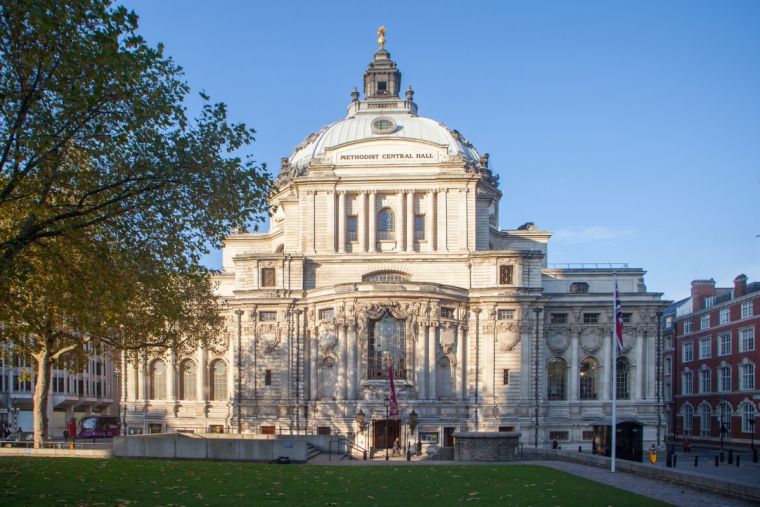Now Forward in Faith Anglo-Catholics blast CofE-Methodist unity plans
Another group of Anglo-Catholics has strongly opposed proposals to end 200 years of schism between the Church of England and the Methodist Church.
The plans to be debated at the CofE's ruling general synod next week centre on allowing ministers from each church to practise in the other's. If passed the move would be 'be a profound sign of reconciliation, a healing of wounds that go back to the orgins of Methodism in the 18th century,' Christopher Cocksworth, the Bishop of Coventry and chair of the CofE's faith and order commission, said.
However those from the catholic wing of the Church of England place great importance on the idea that churches should be led by bishops, who follow on from Jesus' apostles in 'apostolic succession'.

They see the CofE's structure of ordination as 'fundamental' to its identity and brand a document outlining the plans to bring the two churches together as 'astonishing'.
Were Anglicans to accept Methodist ministers they would have to be ordained to fit into the 'apostolic succession'. Under the proposals an Anglican bishop would take part in ordaining new Methodist ministers but existing Methodist presbyters would not have to be re-ordained – a point the CofE's bishops consider a 'bearable anomaly'.
Now, however, the group Forward in Faith has issued a statement saying that the proposals represent 'a fundamental breach of catholic order'.
The group said today: 'Anglo-Catholics are among those who are most committed to the full visible unity of Christ's Church. We are therefore grateful to those who have worked to produce the present proposals for a development in Anglican-Methodist relations, which the Forward in Faith Executive Committee considered at its meeting on 31 January. It is a matter of regret that we must oppose them in their current form... To permit those who have not been ordained by a bishop to minister as Church of England priests, even for a 'temporary' period (which might last for sixty or seventy years) is for us not a "bearable anomaly" but a fundamental breach of catholic order.
'We deeply regret that the report rules out further consideration of this issue. As loyal Anglicans, we uphold the doctrine and discipline regarding Holy Orders that is enshrined in the historic formularies of the Church of England, and in the 1662 Ordinal in particular. We shall oppose any proposals that would effectively set that doctrine and discipline aside.'
Forward in Faith concluded: 'We remain fully committed to the search for the full visible unity of Christ's Church, but we do not believe that it can be advanced by sacrificing catholic order and Anglican integrity.'
The criticism folows a separate statement yesterday from Anglican Catholic Future, a network of Anglo-Catholic parishes across England, questioning what the future holds for traditionalists were the proposals to go ahead.
'For Anglicans, the ordering of the Church's ministry is not simply some incidental matter of governance, but the means through which the sacramental life of the Church and its unity are guarded and expressed,' it said.
'Astonishingly, it is proposed that these historic formularies, so long the repository of the Church of England's self-understanding and a framework for her unity, be open to suspension or amendment simply because the principles they uphold – both Anglican and ancient – are taken to be inconvenient.'
The plans are set out in a document entitled Mission and Ministry in Covenant and will be discussed by the CofE next week and, if passed, by the Methodist Church in the summer. The hope is that if the two Churches joined forces, they could combine resources particularly in areas 'where there are serious challenges in sustaining a Christian presence', a briefing for synod members said.
The proposals, if agreed, would also mean that for the first time ever Methodists in the UK would have a bishop of their own. The person elected annually as president as the Methodist Conference would take the title 'President-Bishop' instead of just 'president' and would be ordained by at least three bishops including bishops from the Church of England.
But the Anglican Catholic Future group rubbished the compromise.
'Simply having people called bishops exercising a ministry of oversight does not mean that we understand the same thing by that term,' its statement read.
'We have already witnessed the painful impairment of communion over the ordination of women,' it goes on to warn. 'The proposals contained in the report, which (as they are currently described) threaten the fundamentals of what it means for our Church to be catholic as well as reformed. In light of this, a unified and public catholic witness is called for.'
It adds that were the plans to go ahead, a separate arrangement would need to be made for those opposed in order to avoid a split.
'However, we hope instead that there will be revision on those points that envisage departure from Anglican principles: we hope that the church will not put itself in the position of needing to enact further protective provision, necessary though it would be, since that would further tear the fabric of Anglican unity, and compound the fragmentation of the Church.'











